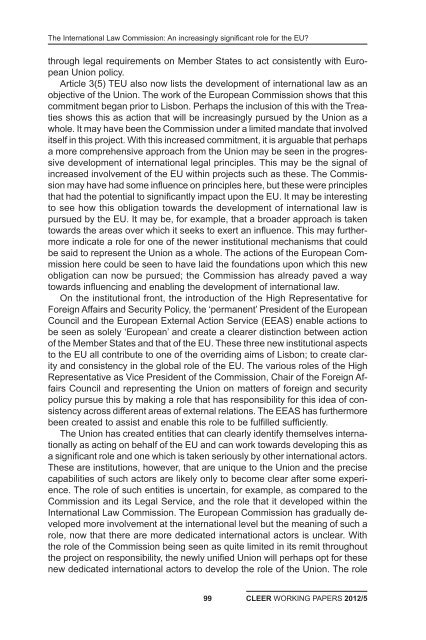Principles and practices of EU external representation - TMC Asser ...
Principles and practices of EU external representation - TMC Asser ...
Principles and practices of EU external representation - TMC Asser ...
You also want an ePaper? Increase the reach of your titles
YUMPU automatically turns print PDFs into web optimized ePapers that Google loves.
The International Law Commission: An increasingly significant role for the <strong>EU</strong>?<br />
through legal requirements on Member States to act consistently with European<br />
Union policy.<br />
Article 3(5) T<strong>EU</strong> also now lists the development <strong>of</strong> international law as an<br />
objective <strong>of</strong> the Union. The work <strong>of</strong> the European Commission shows that this<br />
commitment began prior to Lisbon. Perhaps the inclusion <strong>of</strong> this with the Treaties<br />
shows this as action that will be increasingly pursued by the Union as a<br />
whole. It may have been the Commission under a limited m<strong>and</strong>ate that involved<br />
itself in this project. With this increased commitment, it is arguable that perhaps<br />
a more comprehensive approach from the Union may be seen in the progressive<br />
development <strong>of</strong> international legal principles. This may be the signal <strong>of</strong><br />
increased involvement <strong>of</strong> the <strong>EU</strong> within projects such as these. The Commission<br />
may have had some influence on principles here, but these were principles<br />
that had the potential to significantly impact upon the <strong>EU</strong>. It may be interesting<br />
to see how this obligation towards the development <strong>of</strong> international law is<br />
pursued by the <strong>EU</strong>. It may be, for example, that a broader approach is taken<br />
towards the areas over which it seeks to exert an influence. This may furthermore<br />
indicate a role for one <strong>of</strong> the newer institutional mechanisms that could<br />
be said to represent the Union as a whole. The actions <strong>of</strong> the European Commission<br />
here could be seen to have laid the foundations upon which this new<br />
obligation can now be pursued; the Commission has already paved a way<br />
towards influencing <strong>and</strong> enabling the development <strong>of</strong> international law.<br />
On the institutional front, the introduction <strong>of</strong> the High Representative for<br />
Foreign Affairs <strong>and</strong> Security Policy, the ‘permanent’ President <strong>of</strong> the European<br />
Council <strong>and</strong> the European External Action Service (EEAS) enable actions to<br />
be seen as solely ‘European’ <strong>and</strong> create a clearer distinction between action<br />
<strong>of</strong> the Member States <strong>and</strong> that <strong>of</strong> the <strong>EU</strong>. These three new institutional aspects<br />
to the <strong>EU</strong> all contribute to one <strong>of</strong> the overriding aims <strong>of</strong> Lisbon; to create clarity<br />
<strong>and</strong> consistency in the global role <strong>of</strong> the <strong>EU</strong>. The various roles <strong>of</strong> the High<br />
Representative as Vice President <strong>of</strong> the Commission, Chair <strong>of</strong> the Foreign Affairs<br />
Council <strong>and</strong> representing the Union on matters <strong>of</strong> foreign <strong>and</strong> security<br />
policy pursue this by making a role that has responsibility for this idea <strong>of</strong> consistency<br />
across different areas <strong>of</strong> <strong>external</strong> relations. The EEAS has furthermore<br />
been created to assist <strong>and</strong> enable this role to be fulfilled sufficiently.<br />
The Union has created entities that can clearly identify themselves internationally<br />
as acting on behalf <strong>of</strong> the <strong>EU</strong> <strong>and</strong> can work towards developing this as<br />
a significant role <strong>and</strong> one which is taken seriously by other international actors.<br />
These are institutions, however, that are unique to the Union <strong>and</strong> the precise<br />
capabilities <strong>of</strong> such actors are likely only to become clear after some experience.<br />
The role <strong>of</strong> such entities is uncertain, for example, as compared to the<br />
Commission <strong>and</strong> its Legal Service, <strong>and</strong> the role that it developed within the<br />
International Law Commission. The European Commission has gradually developed<br />
more involvement at the international level but the meaning <strong>of</strong> such a<br />
role, now that there are more dedicated international actors is unclear. With<br />
the role <strong>of</strong> the Commission being seen as quite limited in its remit throughout<br />
the project on responsibility, the newly unified Union will perhaps opt for these<br />
new dedicated international actors to develop the role <strong>of</strong> the Union. The role<br />
99<br />
CLEER WORKING PAPERS 2012/5

















